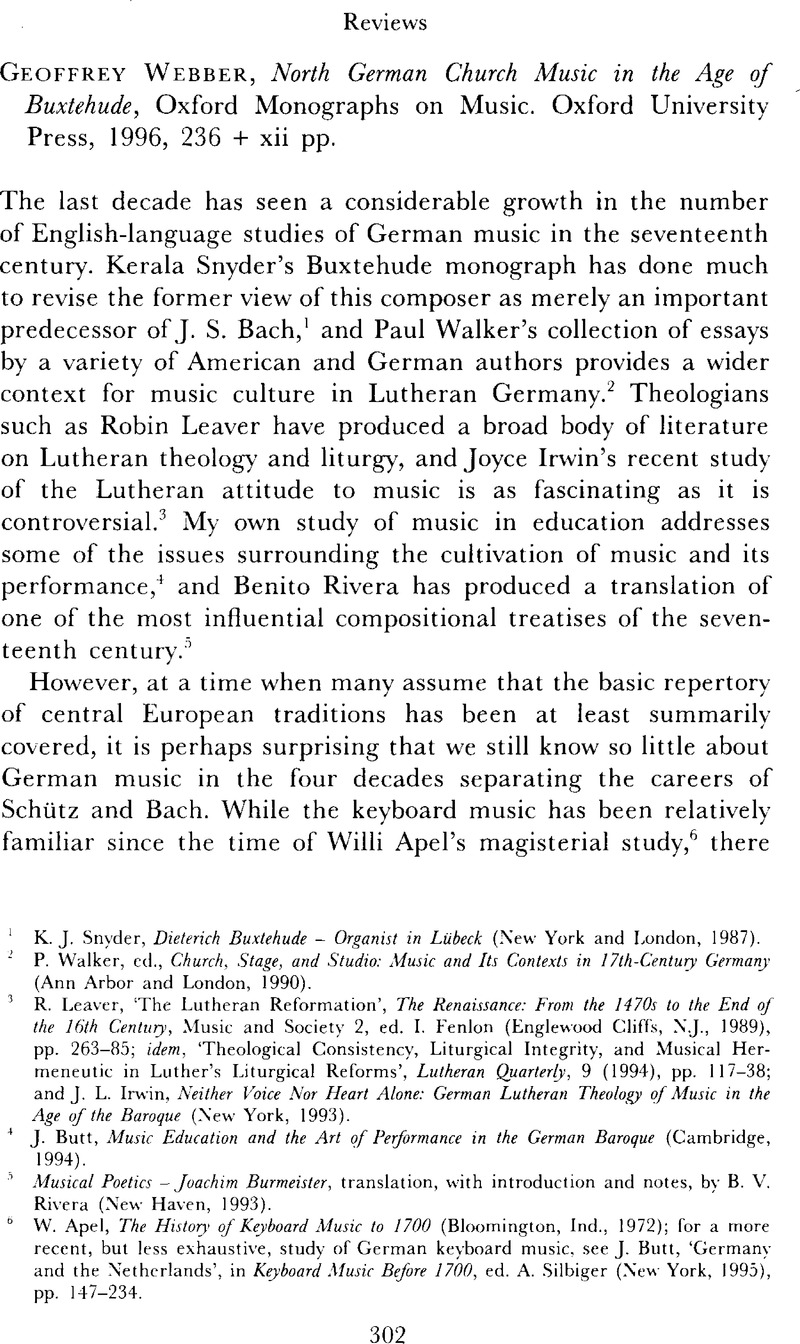No CrossRef data available.
Published online by Cambridge University Press: 05 December 2008

1 Snyder, K. J., Dieterich Buxtehude – Organist in Lübeck (New York and London, 1987)Google Scholar.
2 Walker, P., ed., Church, Stage, and Studio: Music and Its Contexts in 17th-Century Germany (Ann Arbor and London, 1990)Google Scholar.
3 Leaver, R., ‘The Lutheran Reformation’, The Renaissance: From the 1470s to the End of the 16th Century, Music and Society 2, ed. Fenlon, I. (Englewood Cliffs, N.J., 1989), pp. 263–85CrossRefGoogle Scholar; idem, ‘Theological Consistency, Liturgical Integrity, and Musical Hermeneutic in Luther's Liturgical Reforms’, Lutheran Quarterly, 9 (1994), pp. 117–38; and Irwin, J. L., Neither Voice Nor Heart Alone: German Lutheran Theology of Music in the Age of the Baroque (New York, 1993)Google Scholar.
4 Butt, J., Music Education and the Art of Performance in the German Baroque (Cambridge, 1994)CrossRefGoogle Scholar.
5 Musical Poetics – Joachim Burmeister, translation, with introduction and notes, by Rivera, B. V. (New Haven, 1993)Google Scholar.
6 Apel, W., The History of Keyboard Music to 1700 (Bloomington, Ind., 1972)Google Scholar; for a more recent, but less exhaustive, study of German keyboard music, see Butt, J., ‘Germany and the Netherlands’, in Keyboard Music Before 1700, ed. Silbiger, A. (New York, 1995), pp. 147–234Google Scholar.
7 Not surprisingly, Webber's Oxford thesis is centred on one of these sources: ‘A Study of the Italian Influence on North German Church and Organ Music in the Second Half of the Seventeenth Century, with Special Reference to the Collection of Gustav Düben’, D.Phil, thesis, Oxford, 1988Google Scholar.
8 Indeed, the book intersects well with my Music Education, which is – with fortuitous reciprocation – primarily concerned with the educational context and gives only scant attention to the musical repertories.
9 See, for instance, Melamed's, Daniel recent study of Bach's place within the German motet tradition, J.S. Bach and the German Motet (Cambridge, 1995)Google Scholar.
10 The role performance tacitly plays in our conception of great musical works is aptly demonstrated by the furore over Bach's vocal scoring, which, as Joshua Rifkin has demonstrated, follows exactly the seventeenth-century convention of using solo singers optionally reinforced by a ripieno group. The fact that Bach may have chosen not to employ the latter very often, and in any case conceived of the ‘choral’ line soloistically, radically challenges our notion of the immutable identity of great music, an identity that seeks its justification in origins yet is often wholly conceived in the process of reception.
11 See, for example Snyder, , Dieterich Buxtehude, p. 90Google Scholar.